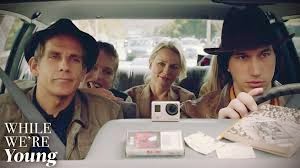Notes on Noah Baumbach's "While We're Young" and the necessity of plotlessness
Noah Baumbach's 'While We're Young' is mostly swell, except the plottiness in the last third. In its desire to have a story, to be a bit about things other than what it is really about, the movie errs and corners itself into an ending that seems like a horribly good, goodily horrible outcome. Here Baumbach forgets what made 'Frances Ha' the masterpiece that it is: character in flux can itself be the story.
In the West, the sense of possibility that better health and lifestyle grant to those in their forties may be helping them tide over typical mid-life tendencies such as sexual adventurism, but is not without side effects. The movie is about those post-modern post-mid-life side effects. Joss and Cornelia, the main couple of the movie, are both in their forties, are married, do not have a child, like their sex, and look great together. They are a successful, non pot-bellied couple. Through a seemingly serendipitous friendship with a younger couple, Joss and Cornelia confront their irrevocable estrangement from Youth with what they discover to be their still-piningly-young hearts. Their initial out-of-syncness is comic; the failed attempts at getting into any sort of a gracious equilibrium are tragic.
Baumbach's film does the above part of the deal excellently.
The young couple that Joss & Cornelia (J&C) become friends with do artisanal slash hipster stuff, like making their own furniture, making their own icecream, riding on bicycles through the city, owning stacks of LPs, et cetera. This is in sharp contrast to the iPhone and iMac owning, SUV owning, CD owning, J&C, who react to this contrast by being a both nostalgic and envious, both to sweet degrees. A montage early in the film establishes all of this hilariously and efficiently and memorably. We are presented a heart-warming mingling of generations, and although we know that things won't last too long like this for the older couple, the only dread at this point is through the complete absence of dread. This is the movie's best part - it makes you feel happy in a way you don't get to in movies or life today.
The two couples share one more thing, which will be the ground for the movie's plottiness - an interest in documentary filmmaking. The story thickens when the younger couple are revealed as manipulators who had always wanted to con the older couple, especially Joss, into helping them make a film. Joss doesn't take being conned too well. and for a fifteen minute phase 'While We're Young' resembles the terribly ordinary 'Young Adult', at least insofar as the Charlize Theron starrer used sexual confusion as an easily insertable proxy for generic mid-life confusion. Eventually Joss confronts Jamie, his younger near-protege, and gives him a mini-lecture that includes a whine about how documented truth is under threat as people shoot everything (do you notice the GoPro camera in the attached picture above?).
The confrontation between Joss and Jamie is interlaced with another lecture by Joss' father-in-law, who is a legend in documentary filmmaking and is having a memorial or something. There is no objectivity, the old man suggests, and therefore, what is shown problematizes Truth. Baumbach's direction coagulates here, as if he were convinced that he was making a vital point. He wants us to know the dilemma of documentary films while showing us fiction, and there is actually no point made at the end of it. We are being asked: Does Jamie's manipulation of Joss make him an unethical documentarian? Maybe, so what?
(Jamie's documentary is apparently good and moving and techinically sound. This is suggested at the private screening in Jamie's house, where his movie is followed by a screening of William Greaves' masterful Symbiopsychotaxiplasm, of which much has been said on this blog.)
The whole final bit about documentaries saps this movie's natural momentum, and although the points made are not entirely without merit, they seem to take away from the Frances Ha-ness that Baumbach was definitely approaching in the first half. Everything that happens after Joss' and Jamie's confrontation seems lifted from a far inferior movie. Things become sappy and juvenile, and we are rushed into an ending that we're supposed to understand as happy.
I felt that the rift between the generations did not need the plot turns; Jamie didn't have to be on the audience's wrong side; things could have been more organic.
The high points? Naomi Watts attending a baby music class and coming out nauseated, Naomi Watts in a hiphop dance class, Ben Stiller & Naomi Watts on hallucinogens, Adam Driver thanking people with Namastes, Adam Driver with a GoPro always by his side. The actors brought a lot of life to this film.
There is a scene in which Ben Stiller's Joss makes a comment to Naomi Watts' Cornelia about the wattage of their bedside lamp. That's probably a lame joke, but if you get it, you'll have more fun for you'll get the rest too.
***
P. S.: Adam Driver had served for two years in Afghanistan. I wonder if this was a component in the writing, for the documentary that Driver's character makes is about a soldier who had a bad time there.
P.P.S.: In the movie, American Wars are shown to be a necessity for the American Liberal Arts scene. This is an eerie, sometimes.



Comments
Post a Comment